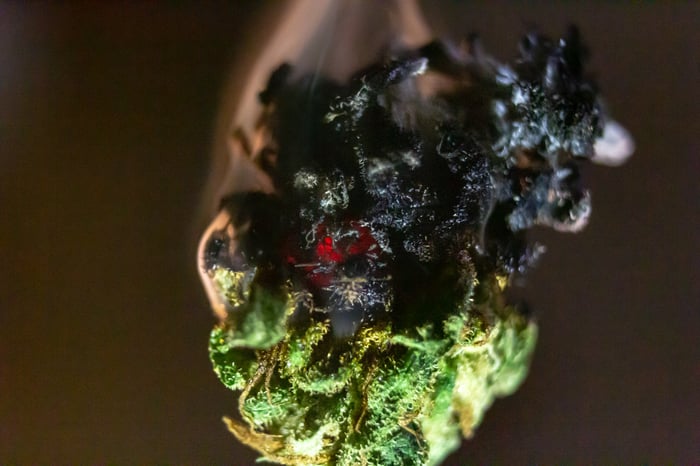Over the next decade, North American cannabis sales should soar. Canada waved the green flag on recreational weed sales on Oct. 17, 2018. Meanwhile, 36 states in the U.S. have legalized medical marijuana, 15 of which also allow for adult-use consumption or retail sale. It's a legitimate, fast-growing business that could very well show investors the green.
However, not all companies in next-big-thing industries can be winners. If you're looking to put your money to work in one of the fastest-growing industries on the planet, avoid the following four marijuana stocks like the plague in 2021.

Image source: Getty Images.
Aurora Cannabis
As has been the case for the past two years, Canadian licensed producer Aurora Cannabis (ACB 18.15%) is possibly the most dangerous pot stock to own. Even with its shares down close to 90% over the trailing three-year period, there's a lot that could still go wrong for the world's most popular pot stock.
The biggest beef that investors should have with Aurora Cannabis is the company's complete disregard for its shareholders. The company has regularly financed its day-to-day operations and acquisitions by issuing common stock. Since April 2019, Aurora has completed at-the-market offering programs of $400 million and $250 million, and its board approved another $500 million in 2020. In plainer English, Aurora's outstanding share count has risen by more than 11,800% since June 2014. It's drowning existing shareholders.
Aside from the constant share issuances, Aurora's management team hasn't exactly inspired confidence. Both the previous and new management teams have punted positive earnings before interest, taxes, depreciation, and amortization (EBITDA) further down the road. This is worrisome because positive EBITDA is needed to avoid defaulting on its updated debt covenant.
Even if Aurora Cannabis is able to finally generate positive EBITDA after significant cost-cutting activity, it's likely years away from turning a profit. A company that's backpedaling in a fast-growing industry isn't where you want to park your money.

Image source: Getty Images.
Cronos Group
Another marijuana stock investors should avoid like the plague in 2020 is Canada's Cronos Group (CRON 4.66%).
Cronos may have the second-most cash on hand of any pure-play pot stock, but its operating performance has been abysmal. In the quarter that ended in September, Cronos produced only 11.4 million Canadian dollars ($8.9 million U.S.) in net sales and a negative gross margin. Through the first nine months of 2020, Cronos' CA$110 million in operating expenses absolutely dwarfs the meager CA$29.7 million in total sales it's recorded. In other words, it's not going to be profitable anytime soon.
Cronos Group also hurt itself by not building up a production presence in Canada. Whereas most of its peers expanded too much, Cronos did the opposite. Its Peace Naturals farm is only capable of 40,000 kilos of pot per year. That's not much at all -- especially in a market craving value-priced dried flower.
But maybe the biggest disappointment of all is that its partnership with tobacco giant Altria Group isn't paying dividends. It was widely expected that Altria would help Cronos Group develop and market cannabis vapes and other derivative products throughout North America. Unfortunately, little progress has been made on this front. Until Cronos can get its higher-margin derivatives segment off the ground, it doesn't belong in your portfolio.

Image source: Getty Images.
HEXO
If you haven't figured it out by now, the plan in 2021 is to avoid most high-profile Canadian licensed producers that mismanaged their early stage expansion. That includes Quebec-based HEXO (HEXO).
I'll admit that by mid-2019, HEXO looked great. It had acquired Newstrike Brands to bolster its capacity, was expected to lean heavily on higher-margin derivative products, and had secured an aggregate 200,000-kilo wholesale order with Quebec over a five-year period. However, regulatory and supply channel issues have plagued the launch of derivatives. Meanwhile, the Newstrike deal ultimately wasn't needed. HEXO eventually wrote down the bulk of the purchase and sold the Niagara facility for a mere CA$10.25 million.
More concerning is HEXO's cash situation. Like Aurora Cannabis, HEXO has been burning through its cash and has turned to share offerings of various forms to raise capital. Although HEXO's outstanding share count hasn't ballooned as much as Aurora's, it's still skyrocketed in recent years. That's bad news for shareholders.
HEXO also recently completed a 4-for-1 reverse split to avoid being delisted from the New York Stock Exchange. Here's a tip: Companies that are in solid financial shape rarely, if ever, have to worry about enacting reverse splits to avoid delisting. HEXO should be avoided in 2021.

Image source: Getty Images.
Canopy Growth
Finally, pot stock investors would be wise to keep their distance from the most cash-rich publicly traded cannabis stock on the planet, Canopy Growth (CGC 15.03%).
Canopy Growth does have what's arguably the best equity partnership in the cannabis space. Spirits giant Constellation Brands (STZ 0.74%) has made four separate direct or indirect investments into Canopy since October 2017, pushing its ownership in Canopy to more than 38%. Constellation Brands has a clear vested interest in Canopy Growth's success, which is likely why its former CFO, David Klein, is now Canopy's CEO.
But like Aurora, Cronos, and HEXO, Canopy Growth is failing miserably in the operating department. Even with Klein overseeing the closure of 3 million square feet of indoor growing space in British Columbia, as well as a significant reduction in share-based compensation, the company's operating loss totaled more than CA$284 million in the fiscal second quarter. Through the first six months of fiscal 2021, Canopy's gross margin is only 13.2% and it's lost almost CA$457 million on an operating basis.
What's potentially scarier is how quickly the company is burning through its monstrous cash pile. By the end of calendar year 2018, Canopy Growth had close to CA$5 billion in cash on its balance sheet. But by the end of September 2020, it was down to CA$1.72 billion. Mind you, this includes a CA$245 million add-on investment from Constellation earlier this year.
The only thing ablaze right now is Canopy's balance sheet. That's not a good thing. Avoid marijuana's biggest stock by market cap in 2021.





